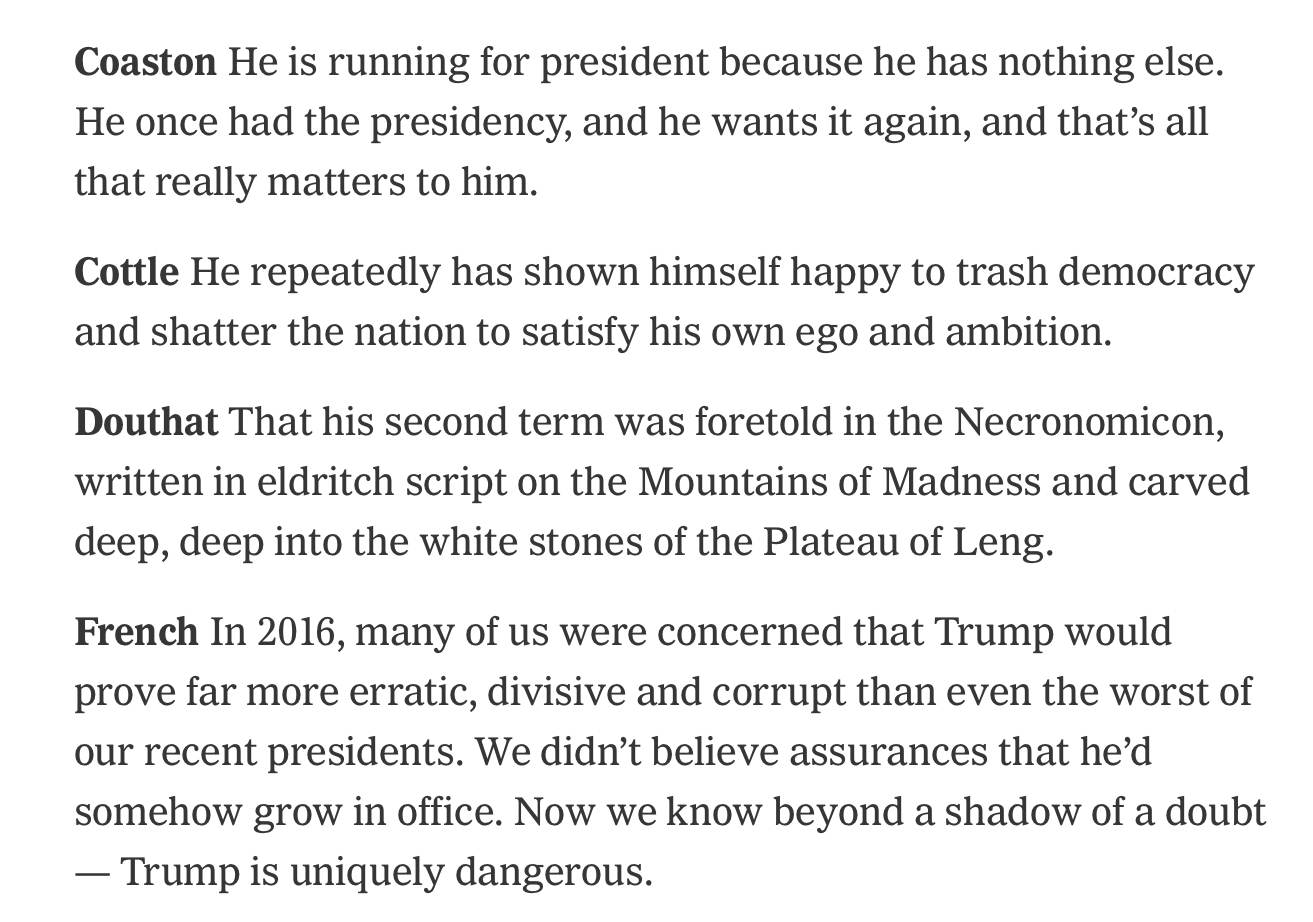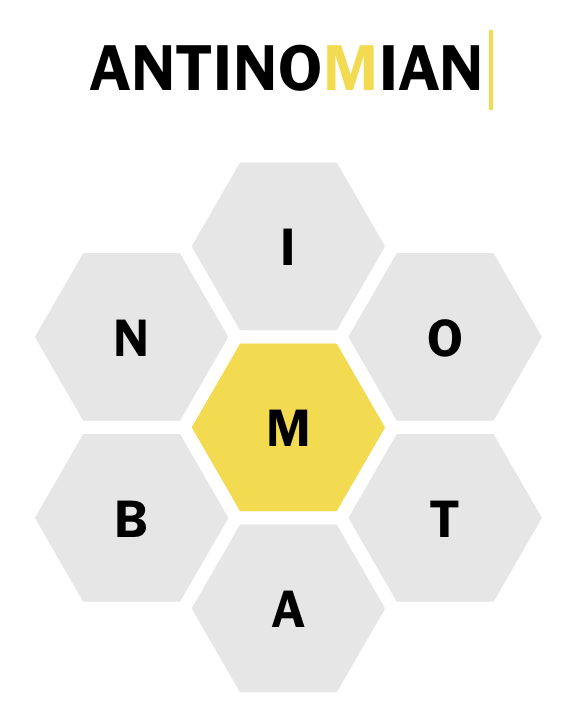I’m not a collector of anything, but this auction of Larry McMurtry memorabilia had some pretty interesting stuff.

Currently reading: Pax Britannica by James (Jan) Morris. This Folio Society edition is one of my treasures. 📚

David Brooks: “If autonomy-based liberals believe that society works best when it opens up individual options, gifts-based liberals believe that society works best when it creates ecologies of care that help people address difficulties all along the path of life.”
I have mixed feelings about the bokeh of iPhone “Portrait” shots. It’s often effective, I guess, but seems unnatural – it looks like a software-generated effect.

Douthat bringing some essential Dark Energy to the question of what matters most about Orange Man as a Presidential candidate

absolutizing (slight return)
Jon Askonas has responded to my earlier post, and his response deserves a fuller counter-response than I can give it right now. These are matters worthy of deeper reflection! I appreciate the slight parting of the curtain Askonas gives late in his post, the peek at his positive vision, and that may provide matter for discussion later. I just want to make a few brief notes right now and then use this post as a bookmark — I’ll return when I have more bandwidth.
- I didn’t accuse Askonas of the “absolutizing of fright” — that was my comment on Michael Anton in his “Flight 93 Election” essay. My claim is that I’m seeing — really everywhere, but because of my own political and religious convictions I’m focusing on my confrères — the escalation of a rhetoric that absolutizes and abstracts. What Askonas absolutizes, I think, is not fright but rather defeat. For someone who holds any tradition dear, the declaration that “Tradition is over” is both absolute and defeatist — “defeatist” not in a pejorative sense but in a strictly descriptive one.
- Askonas: “One of the frustrating things about the line of criticism Jacobs undertakes is that it is highly personalist and individualistic, as if it was within the power of any individual to always conserve the things that he loves.” Successful conservation is not within my power, but the practice of conserving is my responsibility. And to say that I have this responsibility is not to say that I must (or even should) pursue it alone. The question What then should I do? is not the only question to ask; but if not sufficient, it is necessary; I can’t evade it by decrying “individualism.” And if (as Askonas does) you’re asking me to join you in a brand-new endeavor, and I wonder what exactly you have in mind, and your primary response to that is Dude, you’re so individualistic! — that’s … not very reassuring.
- Askonas: “Selection effects drive a local increase in virtue and faithfulness. The strength of the tradition in these unique, rare local places masks the global decline…. The question is not whether these, the best men and women, may pass on their traditions, but whether their number are increasing or decreasing in society on the aggregate.” (I think by “global” Askonas means “in the West.”) As far as I can tell, Askonas here has conceded my point and abandoned his own. For if tradition thrives anywhere, then tradition is certainly not “over”; and ”decreasing“ is not a synonym for ”over.“ And if tradition is not over, then the question becomes, not “What will we do instead of practicing our dead tradition?” but rather “How can we who are blessed by a living tradition share that blessing with others?” or “How can we who are missing a living tradition draw on resources that have been well-conserved elsewhere?” (All this applies to the Black community also, as Albert Murray well understood. He was so passionate an advocate of the best traditions of Black American life precisely because he saw them embattled and endangered. This is a constant theme in his work.)
- But I don’t think Askonas believes he has abandoned his point, because he makes a strong contrast between ”organic outgrowths of tradition” and “intentional projects of retrieval or revival from the long-dead past.” (Thus on his reading the classical school movement, which he likes, does not count as an example of living tradition, or a practice of conserving, because, remember, “We can no longer conserve.”) The idea that tradition isn’t really tradition unless it is unselfconsciously inherited and inhabited is one of the classic errors of Romanticism, an error prompted by the inevitably fruitless longing to reverse what Harold Bloom, among others, called the “fall into self-consciousness.” No; Eliot, again, was right when he said that “Tradition … cannot be inherited, and if you want it you must obtain it by great labor.” This may be the single most crucial point of disagreement between Askonas and me, and the one from which all the others flow.
- Askonas tells me the questions I should be asking instead of the one I asked him, under the apparent assumption that I haven’t asked them. That is, as it happens, not a safe assumption, though I don’t expect Askonas to know that. But for the record, this blog — not to mention dozens of essays and a few books — is full of my attempts to answer them.
- Finally, it seems to me that Askonas replies to my critique of his tendency towards vague but alarming imagery by doubling down on that tendency. Anton had his plane crashing, Kingsnorth has his ocean liner sinking, and now Askonas gives us Troy burning. (It’s disasters all the way down! There are no gradual changes in the cosmos of this mentalité, just crises requiring instant and extreme action.) Troy is burning, he says, though I don’t know what it means to say that we live in a conflagration, nor do I know what the contemporary equivalent of sailing to Italy by way of Carthage might be. He is annoyed with me for not knowing “what time it is” — but I think I do know. It’s time to do justly, and love mercy, and walk humbly with our God. It’s time to seek the good of the city in which we live as pilgrims. It’s time to preach the Gospel in season and out of season. All these metaphors of disaster are just distractions from our undramatic daily calling. “The rest is not our business.”
More later; maybe quite a while later. I need to get back to the City of God — posts on that topic will resume next week. And in a way they’ll be continuations of this debate.
UPDATE: It occurs to me, looking at this again, that I probably don’t need to say any more on this subject. By acknowledging that tradition isn’t over (only under challenge in many places) and that we can conserve (but conservation is not sufficient), Askonas has retracted the chief points that I wished to dispute. And anyway, I just realized that his is yet another version of the “negative world” position that is impervious to evidence and that I promised myself I wouldn’t respond to any more. (Why can’t I remember my self-promises?)
I will begin to consider the possibilities of the iPad as a work device when I can set a default app for opening text files.
“Not in word list.” Grrrrr.

Marc Andreessen wrote a terrible essay and I annotated it.
The second Goat Rodeo record is fine, but the first one is absolutely sublime, and I’m re-listening. A while back I wrote a post about my favorite song on that record. ♫
Charlie Warzel: “I reminded myself to chill out, stop being such a doomer, and move on. But about 18 hours later, I woke up to images of the East Coast with that familiar climate-apocalypse Instagram filter. My mind wandered back to the Vision Pro, an advanced marvel of immersive technology with the primary purpose of shielding our eyes. An excellent device for an imperiled planet.”
I wrote about people who make apocalyptic or absolutist claims that … I just don’t understand.
absolutizing and abstraction, conservation and piety
Some years ago I wrote a post on what I called “the absolutizing of fright”:
I have the same questions about the notorious “Flight 93 Election” essay, which says “2016 is the Flight 93 election: charge the cockpit or you die.” And also says, “a Hillary Clinton presidency is Russian Roulette with a semi-auto.” And also says, “we are headed off a cliff.” Later our pseudonymous author says that conservatives will be “persecuted,” will be “crushed,” and under a Hillary presidency America will be “doomed.” But what precisely is he talking about? It’s absolutely impossible to tell. He doesn’t give even a hint.
Under a Clinton presidency, would socially-conservative evangelical Christians like me have been fired from our jobs, driven from our homes by the military, and sent to re-education camps? Would we have been forced to sign some sort of Pledge of Allegiance to the Sexual Revolution, under threat of imprisonment? What?
This kind of rhetoric — featuring an undefined alarm and an undefined response to that alarm — has if anything escalated and spread since then. For instance, in a recent essay Paul Kingsnorth talks about allowing the concept of “the West” to die:
Maybe we need to let this concept fall away. To let it crumble so that we can see what lies beneath. Stop all the ‘fighting’ to preserve something nobody can even define, something which has long lost its heart and soul. Stop clinging to the side of the sinking hull as the band plays on. We struck the iceberg long ago; it must be time, at last, to stop clinging to the shifting metal. To let go and begin swimming, out towards the place where the light plays on the water. Just out there. Do you see? Beyond; just beyond. There is something waiting out there, but you have to strike out to reach it. You have to let go.
I have never been sure what people mean by “the West” either, so I hold no brief for the term. But Kingsnorth’s counsel? I have absolutely no idea what he might mean. I can’t even guess. It’s in the same disaster-porn mode as “The Flight 93 Election,” though Kingsnorth features a sinking ocean liner rather than a crashing plane. But I don’t understand the image. I don’t know how it translates into beliefs or actions, though whatever it means, it’s consistent with having a Substack, I guess. Might it also be consistent with preserving and transmitting the best ideas and the greatest achievements of those cultures that we typically identify with “the West”?
Along similar lines: last year Jon [not Josh, as I earlier wrote] Askonas published an essay called “Why Conservatism Failed,” in which he wrote, “We can no longer conserve. So we must build and rebuild and, therefore, take a stand on what is worth building.” I don’t understand this either. If you’re rebuilding something aren’t you conserving some elements of it — or at the very least the memory and the idea of it?
And can we really “no longer conserve”? To conserve is surely to inherit or discover something of value and then attempt (a) keep it in good condition when you can, (b) repair it when it needs repair, and (c) pass it along to the next generation. I’ve been doing that my entire adult life, in a thousand ways. I’ve tried to teach my son the manners, morals, and convictions that I learned from the family I married into. I hope he’ll teach them to his children. I have taught and written in defense and celebration of the great books that previous generations preserved for me; of certain strenuous but also illuminating and life-giving ways of reading; of the rich inheritance of liturgy and hymnody that the churches in my life have introduced me to; of the world-centering and world-transforming story of Jesus Christ. I hope that those I have taught will receive all this as their inheritance and in their turn preserve and transmit it. Many, many others I know have done the same work. Is this not conserving?
Askonas writes that “we are living after tradition” — but are we? I have received rich and wonderful traditions, have been blessed by them, and work for their perpetuation. Askonas also writes, “Those who look to build a human future have been freed from a rearguard defense of tradition to take up the path of the guerrilla, the upstart, the nomad.” Again: what does this mean? Like me, Askonas is a professor at an American university. How is this being a “nomad”? How is this being a “guerrilla”? Those seem like better descriptors for these guys.
Like Paul Kingsnorth, Askonas is speaking an imagistic language that strongly resists translation into specific beliefs and practices. Even when he suggests the possibility of “wild new technological practices,” it’s impossible to tell whether he’s referring to biotechnology, information technology, architecture, infrastructure — it could be anything, or nothing. The sheer abstraction is stultifying.
Are our circumstances difficult? In some ways, sure. I’m sympathetic with T. S. Eliot’s view:
There is only the fight to recover what has been lost
And found and lost again and again: and now, under conditions
That seem unpropitious. But perhaps neither gain nor loss.
For us, there is only the trying. The rest is not our business.
But at many points in the history of the traditions I have gratefully received, the conditions seemed (indeed were) even less propitious. And yet the faithfulness of those who loved those traditions was not exercised in vain.
My friend Tim Larsen speaks of the cacophony of new faiths that sprang up in America in the first half of the nineteenth century as “do-over religions.” Some of the language in the pieces I have been quoting sounds like the rhetoric of a do-over religion, and I fear that to think in this way is to despise the great work of our faithful elders and faithful ancestors. My concern is that writers like Kingsnorth and Askonas have not tried conservation and found it impossible, but found it challenging and left it untried.
On the Netflix series High on the Hog, in the episode “The Rice Kingdom,” the food historian Michael W. Twitty makes a crab and okra soup — okra of course being a vegetable that slaves brought from West Africa — and comments, “Despite the fact that we were in hell, that we were being worked to death, we created a cuisine.” And note that that cuisine depended on elements of old food traditions that they had conserved — conserved in the most unpropitious circumstances imaginable. I concluded my recent essay on Albert Murray by quoting the great man on just this point:
And man prevails through his style, through his elegance, through his control of forces. Not through his power, but through his control. People who confuse art with attack forget that what art is mainly concerned about is … form, and adequate form, and the artist is the first to know when a form is no longer as serviceable as it was. You see? And that’s what innovation is about. He’s trying to keep that form going, and he finds it necessary to extend, elaborate it, and refine it; to adjust it to new situations. That’s what innovation is about. It’s not to get rid of something simply to be getting rid of it, or to turn something around. It’s to continue something that is indispensable.
A people who underwent centuries of slavery could think this way, could create all that they have created, but we can’t conserve? Tradition is over? Give me a break.
But maybe this rhetoric not what it sounds like. Maybe it’s more constructive than it sounds. But because of the relentless vagueness of the imagery, the hand-waving abstraction, I can’t tell. So what I wonder is this: By the lights of this new do-over religion, what, specifically, should I be doing instead of what I have been doing? Until I find out, I’m going to keep practicing piety.
At Vanderbilt University’s Peabody College, administrators were even caught turning to ChatGPT to write a condolence note to the student body in the wake of a mass shooting at another school. The administrators apologized, but upon examining the note, it’s easy to see why they turned to AI. The bland corporatese of “we must reflect on the impact of such an event and take steps to ensure that we are doing our best to create a safe and inclusive environment for all” is the work of a human trying to erase any trace of humanity.
Charlie Stross on A.I. hype: “The real promise here is that corporations will be able to replace many of their flawed, expensive, slow, human information-processing sub units with bits of software, thereby speeding things up and reducing their overheads.” As David Streitfeld, the author of the article, says, “Despite all the talk of A.I. being an unlimited wealth-generating machine, the people getting rich are pretty much the ones who are already rich.”
He’s become a big boy.



